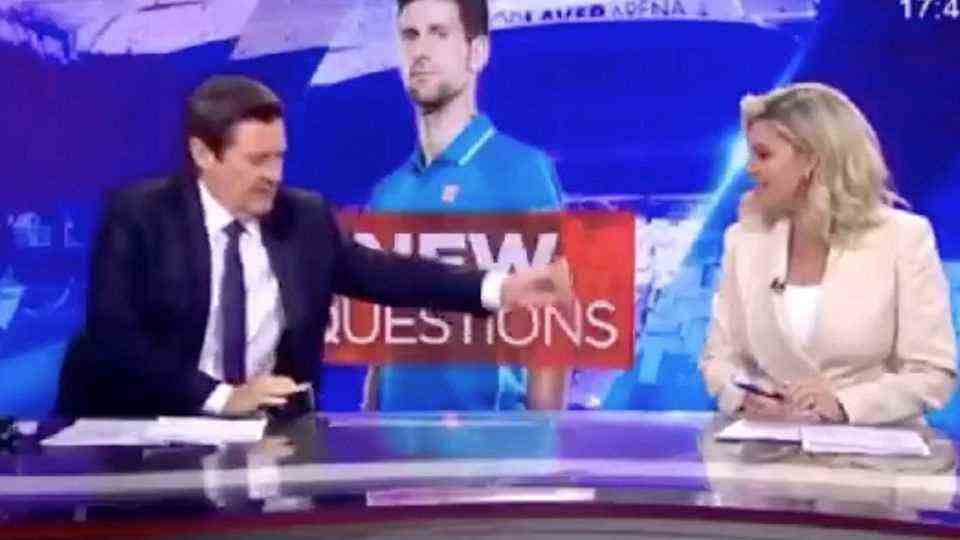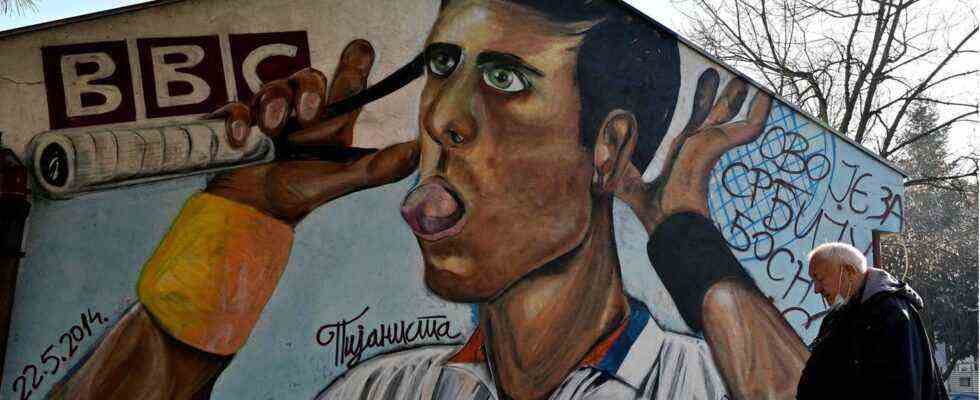analysis
Australian Open
Djokovic, politics, organizer: Who should learn what lessons from the visa affair
Djokovic mural in Belgrade: In the future, the current number 1 in tennis will have to show more respect.
© Andrej Isakovic / AFP
After the end of the visa affair, the question arises: What follows from the farce that dominated the world news for around ten days? Not only tennis star Novak Djokovic should learn his lessons from it.
The Australian Open is running, Novak Djokovic is not there. And now? Lots of excitement and that’s it? That will certainly not be the case for what is probably the best tennis player in the world at the moment. There is talk of lasting image damage anyway. And the question arises as to whether Djokovic, known as a vaccine skeptic, will stick to his stance and accept a kink in his unprecedented career. Because if the corona pandemic does not subside significantly, he will probably not be able to start in the three other Grand Slam and several other tournaments this year as an unvaccinated person.
Reason enough for the current number 1 in the tennis world to take a deep dive and think about what will happen to him from the visa posse, which has been jazzed up into a state affair for no reason. However, this does not only apply to Djokovic. The Australian government and authorities down under as well as the organizers of the Australian Open have also played their part in the unspeakable back-and-forth, which has damaged their reputation. So what lessons can be learned from the Djokovic case?
Politics and authorities: Clear rules
Whether it can be comforting that elsewhere – namely in Australia – there are similar problems with the corona rules between the federal and state levels as in this country, everyone can answer for themselves. In any case, the Djokovic case makes it clear how very clear rules and guard rails are necessary in turbulent times of the pandemic in order to provide orientation. Unfortunately, it was unclear between Australian politicians, the authorities and institutions of the country which rules apply to whom and when.
The question still remains unanswered as to who and on what basis Novak Djokovic initially granted entry to Australia with a special permit as an unvaccinated person – and thus got the whole thing rolling. What arguments did the tennis star use to convince the authorities of a country that, in the early phase of the pandemic, sometimes even prevented compatriots from returning from abroad and just made Melbourne, the venue of the Australian Open, the world capital of the lockdown (a good 260 days in total)? “Rules are rules,” said Prime Minister Scott Morrison in the course of the affair. As stale as the words of the head of government, who was up for election in May, were at the time they were uttered, that must actually be the lesson from the Djokovic case. Not just for Australia’s government. It is also such farces that serve as a gateway for populists and conspiracy supporters. It’s a good thing that the rule of law ultimately proved capable of acting.

Professional sports: No more hubris
What persuaded the organizers of the Australian Open to offer Djokovic the prospect of participating in the tournament with some kind of exemption is also a question that has not been satisfactorily answered. The fact that professional sport, even in times of a pandemic, believes that it can easily claim a special position is discussed again and again in Germany in connection with the Bundesliga. However, the fact that a well-known sports organizer offers an athlete who guarantees prestige the opportunity to start without paying attention to or possibly ignoring the fact that this contradicts the country’s entry regulations is evidence of pronounced hubris.
The lesson from this is actually self-evident: Under the difficult conditions of a pandemic, the conditions of participation and entry requirements must of course be coordinated with each other. Had this happened, Novak Djokovic and the world would have been spared one thing and the reputation of the Grand Slam tournament in Melbourne would not have been tarnished. Luckily, France seems to have made progress. Gilles Moretton, President of the French Tennis Association, said in the sports newspaper “L’Équipe” that there were discussions about how to deal with unvaccinated players for the Grand Slam tournament in Paris, but he also made it clear: “Without the consent of the Authorities will do nothing.” That’s right.
Novak Djokovic: Respect and rules
Of course, the main actor in the tennis affair has the biggest questions. It is obvious that it was wrong to force participation in Melbourne with incorrect or questionable information. The nationalist-martial appearances of his family and the Serbian government also harmed Novak Djokovic. The image is largely gone. After all, the 34-year-old now shows respect, albeit quite late, by allegedly not wanting to comment further for the duration of the Australian Open.
The Serbian world star has no lesser question than the future of his career. If he sticks to his vaccination skepticism, a start in Paris and at the US Open already seems impossible. Other tournament organizers also require participants to be vaccinated in order to ensure the health of everyone involved as far as possible. This basically puts Djokovic’s attitude to the test. If he persists, he threatens to jeopardize his career. The best way out would be to rely on an early end to the pandemic. Whatever conclusions he draws, Djokovic should once again have become aware of a matter of course for athletes through the visa affair: the game is played according to the applicable rules. Without exception.


